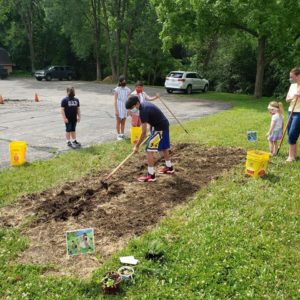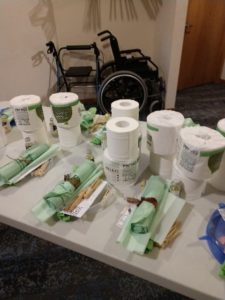Memorial UCC in Fitchburg Uses Diverse Activities to Care for Mother Earth
Apr 25, 2022
By Jill Carlson
“Kairos” is a Greek word meaning “the right, critical or opportune moment.” With the climate crisis growing more desperate every day, the United Church of Christ issued a Kairos Call to Action. The Wisconsin Conference embraced that call and urged congregations to engage in this important work.
In response to that call, Memorial UCC in Fitchburg and its nine-member Green Team undertook a range of activities:
- Writing a covenant
- Establishing sustainability goals
- Planning nature-oriented events
Two specific projects designed to move the needle on the congregation’s sustainability goals: distributing Earth-friendly cleaning and personal care products and a “Three Sisters” seed distribution.
Memorial UCC Creation Justice Covenant
Because we are committed to eco-faith and eco-justice, Memorial UCC has welcomed planet Earth as a member of our congregation. We celebrate, restore and nurture the Earth so that future generations will be able to thrive on a clean, pollution-free planet. We affirm our responsibility to environmental stewardship and Earth justice to care for and nurture God’s creation. We are dedicated to continue the sustainable efforts currently in place and to implement our Kairos sustainability goals for the beauty of the Earth.
A Long-Term Commitment
MUCC developed a set of sustainability goals in the form of a 10-year Kairos sustainability plan. These are goals that will be met over the course of a decade to help MUCC members become better stewards of the environment and also bring awareness of ongoing environmental issues.
- Finding ways to reduce the use of plastics
- Teaching the congregation how to assess our carbon footprints and how to make changes that will shrink these footprints
- Promoting responsible eating habits to reduce food waste
- Learning the connection between Environmental Justice and Social Justice
- Investigating climate change and what we can do to slow it
- Taking political action around the topic of protecting our environment
- Studying the technologies of transportation and reducing the impact of travel on the environment
- Discovering the positive impact of time spent in nature
- Connecting to the broader church and community
Earth-Friendly Events – Getting Everybody Involved
MUCC has carried out numerous events and activities to encourage members to grow in their commitment to Creation Care.
In April 2021, in keeping with its new Creation Justice covenant, the congregation welcomed Mother Earth as an MUCC member during the Earth Day worship service.
In May 2021, some MUCC members participated in a sustainability bike tour of Fitchburg. The 9-mile, 2.5-hour tour highlighted some of the steps taken in recent years to reduce Fitchburg’s ecological footprint.
 During the summer, children created an outdoor Bible garden featuring plants that were grown during biblical times. The project including learning about:
During the summer, children created an outdoor Bible garden featuring plants that were grown during biblical times. The project including learning about:
- Some of the 125 plants mentioned in the Bible, and the stories and verses that mention them
- The way the very different conditions involved (oxen: yes; water hoses or sprinklers: no) in helping plants flourish in biblical times
- How to make meals with the fruits, vegetables and herbs that were used more than 2,000 years ago.
Additional ideas and resources:
- An open-mic evening concert for participants to sing or play songs with a nature theme.
- Nature walks on the congregation’s property with a guide who can identify trees and plant species.
- Volunteers who help care for trees and gardens on our property are available to welcome people and explain what they do to help keep our grounds lovely and help us to be “green.”
- Volunteers who worked on our building’s solar panel project in 2018 talk about how the panels help MUCC save money and generate energy.
- The eight videos from the UCC-sponsored series Sustaining Creation: A Faith Journey for Small Groups. The series included discussion groups led by Green Team members. Click for more information about Sustaining Creation.
- Participation in the Restoring Relationship with Mother Earth immersion event at Daycholah Center.
- All-church reads of books such as “Braiding Sweetgrass: Indigenous Wisdom, Scientific Knowledge and the Teachings of Plants,” by Robin Wall Kimmerer; “Because We’re All Forever Earthbound,” by Wisconsin environmental advocate Chuck Tennessen; and “Eco-Faith – Creating and Sustaining Green Congregations,” by Charlene Hosenfeld.
Other activities designed to follow through on specific sustainability goals included a project aimed at reducing the use of plastics, a move to encourage people to switch to Earth-friendly products, and an upcoming “Three Sisters” seed distribution.
EXAMPLE PROJECT: Reducing the Use of Plastics and Switching to Earth-Friendly Products
One priority in the MUCC Kairos plan is finding ways to reduce the use of plastics and encouraging people to switch to Earth-friendly products.
Plastic is part of so much of what we use – from plastic produce bags and shopping bags to plastic bottles and containers for water, shampoo, body wash, dish and laundry detergent and many other products. Sadly, oceans have become dumping zones for discarded plastics causing harm to the aquatic wildlife including fish, whales, coral reefs and plants.
The Green Team decided to make reduction in use of plastics to be the first project of the group and is working to help Memorial members reach that goal in their homes.
In 2019, MUCC distributed mesh produce bags to members, as well as to members of the general public at Pride Fest. The mesh bags replace the plastic produce bags at the grocery store. A recent Earth-friendly product giveaway at MUCC included reusable lids to cover bowls rather than using plastic wrap.
Next, MUCC carried out a project to make it easier for people to use Earth-friendly products, such as:
- Compostable garbage bags
- Multipurpose cleaner concentrate
- Metal or glass spray bottles for the cleaner
- Laundry sheets
- Bamboo toilet paper
- Recycled toilet paper
- Toothpaste tabs
- Shampoo bars
- Silicon bowl lids
- Beeswax wrap dish covers
Changing the products used for housecleaning and for personal care in order to help the environment is a giant step for many people. There are so many Earth-friendly products on the market . . . but which work, and which don’t get the job done?
Seven members of the Green Team at Memorial made choosing Earth-friendly products easier by conducting their own product trials over a period of two months. The products listed above were those selected for introduction to members of the wider MUCC community.
The project was supported by a $1,000 grant from the Wisconsin UCC Conference and $500 added by Memorial UCC’s trustees. To support local businesses and reduce the carbon footprint of delivery, some of the green items were purchased at the Green Life Trading Co. in Madison and at Woodman’s. Other items were purchased at Target and online.
 Forty-four bags were assembled and distributed free to MUCC members in June. Each bag contained 15 products. A survey was sent to recipients of the bags to get input as to which products recipients preferred. Additionally, voluntary donations of almost $200 allowed us to purchase and donate 50 bottles of “green” multipurpose cleaner for the Good Neighbors Personal Essentials Pantry.
Forty-four bags were assembled and distributed free to MUCC members in June. Each bag contained 15 products. A survey was sent to recipients of the bags to get input as to which products recipients preferred. Additionally, voluntary donations of almost $200 allowed us to purchase and donate 50 bottles of “green” multipurpose cleaner for the Good Neighbors Personal Essentials Pantry.
Moreover, because one of the goals of the Green Team is to reduce the use of single-use plastics such as containers from deodorants and other products, some of the Green Team members made do-it-yourself products including deodorant and shared recipes with MUCC members. (The deodorant recipe is included at the end of this article.)
“I think we selected products that most folks would be willing to try,” said Cindy Rosch, leader of the MUCC Green Team. “Our Green Team is made up of talented, enthusiastic environmentalists.”
EXAMPLE PROJECT: Three Sisters Seed Distribution
The Green Team at Memorial UCC in Fitchburg will offer an additional way for the congregation to be involved in sustainability and care for the Earth with a Three Sisters seed distribution in this May.
The Three Sisters are corn, beans and squash, a companion planting that sustained Native Americans physically and spiritually for over three centuries.
As one of the many Green Team projects, Memorial congregants last fall read “Braiding Sweetgrass: Indigenous Wisdom, Scientific Knowledge and the Teachings of Plants,” by Robin Wall Kimmerer. Kimmerer, a member of the Citizen Potawatomi Nation, explained that acre for acre, a Three Sisters garden yields more food than if you grew each of the sisters alone.
An illustration by Charlotte Ricker explains the steps involved in planting a Three Sisters garden. The steps show six kernels of corn planted in a two-foot diameter circle. Four bean seeds are evenly spaced around each stalk when the corn is about five inches tall. Six squash seeds are placed around the perimeter about a week later.
The corn provides the structure for the beans, which vine around the stalks. The large leaves of the squash provide shade, keeping the soil cool, moist and weed-free. Together, the three sisters provide both sustainable soil fertility and a healthy diet come harvest time.
“The way of the Three Sisters reminds me of the basic teachings of our peoples,” Kimmerer said in “Braiding Sweetgrass.” “The most important thing each of us can know is our unique gift and how to use it in the world. Individuality is cherished and nurtured, because, in order for the whole to flourish, each of us has to be strong in who we are and carry our gifts with convictions, so they can be shared with others. Being among the sisters provides a visible manifestation of what a community can become when its members understand and share their gifts. In reciprocity, we fill our spirits as well as our bodies.”
The Memorial UCC Green Team plans to distribute corn, bean and squash seeds to the congregation after an upcoming service. A ceremonial Three Sisters planting demonstration will occur in the church garden sometime in May.
The Memorial Green Team distributed sunflower seeds to the congregation on Easter Sunday to honor the besieged people of Ukraine. A vegetable and flower seed and a plant exchange are also planned for this spring so the congregants can share the wealth of their garden with others. Planting for the Future is the theme for Memorial services between Easter and Pentecost, continuing our celebration of the Earth.
Recipe for DIY Deodorant
1/3 cup melted coconut oil
1/2 cup baking soda
1/2 cup corn starch
20 drops essential oil for scented deodorant
Mix ingredients together and pour the mixture into the container of your choice. An empty stick deodorant container works well. Allow the mixture to cool and solidify, either at room temperature or in the refrigerator. Apply to underarms daily. During warm weather, keep the deodorant in the refrigerator to keep it from melting.
Jill Carlson is a member of the Green Team at Memorial UCC in Fitchburg.
‹ Back to News & Updates



Sign up for our newsletter!
Find us on
Contact Us